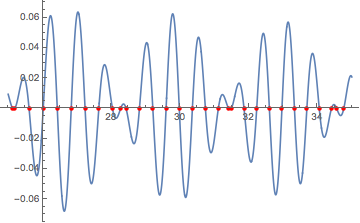First, it might be worth pointing out that in recent versions of Mathematica, Solve and NSolve are quite strong at solving equations with standard special functions.
With[{f = BesselJ[1, #^(3/2)] Sin[#] &},
solvesol = x /. Solve[{f[x] == 0, 25 <= x <= 35}, x];
Plot[f[x], {x, 25, 35},
MeshFunctions -> {# &}, Mesh -> {solvesol},
MeshStyle -> Directive[PointSize[Medium], Red]
]
]
Solve::nint: Warning: Solve used numeric integration to show that the solution set found is complete. >>

For other functions, provided they are continuous and not too oscillatory, then in addition to ODE approach in yohbs's NDSolve solution, we can solve the system with a DAE that does not need the function to be differentiable.
ClearAll[NrootSearch2];
Options[NrootSearch2] = Options[NDSolve];
NrootSearch2[f_, x1_, x2_, opts : OptionsPattern[]] :=
Module[{x, y, t, s},
Reap[
NDSolve[{x'[t] == 1, x[x1] == x1, y[t] == f[t],
WhenEvent[y[t] == 0, Sow[s /. FindRoot[f[s], {s, t}],
"zero"],
"LocationMethod" -> "LinearInterpolation"]},
{}, {t, x1, x2}, opts],
"zero"][[2, 1]]];
With[{f = BesselJ[1, #^(3/2)] Sin[#] &},
nrootsol = NrootSearch2[f, 25, 35];
Plot[f[x], {x, 25, 35},
MeshFunctions -> {# &}, Mesh -> {nrootsol},
MeshStyle -> Directive[PointSize[Medium], Red]
]
]
For functions like the example we've been using, we can combine the previous method with Root to produce exact results. (Caveat: Managing the precision of the approximate root is not always straightforward. Adjusting the WorkingPrecision option to FindRoot might be necessary. The code below tries it first at $MachinePrecision, and if that fails, then it tries a WorkingPrecision of 40.)
ClearAll[rootSearch2];
Options[rootSearch2] = Options[NDSolve];
rootSearch2[f_, x1_, x2_, opts : OptionsPattern[]] :=
Module[{x, y, t, s, res, tmp},
Reap[
NDSolve[{x'[t] == 1, x[x1] == x1, y[t] == f[t],
WhenEvent[y[t] == 0,
Sow[Quiet[
res = Check[
Root[{f[#] &,
s /. FindRoot[f[s], {s, t}, WorkingPrecision -> $MachinePrecision]}],
$Failed]];
If[res === $Failed, (* if $MachinePrecision fails, try a higher one *)
Quiet[
res = Check[
Root[{f[#] &,
tmp = s /.
FindRoot[f[s], {s, t}, WorkingPrecision -> 40]}],
res = tmp]]]; (* if both fail, return approximate root *)
res,
"zero"],
"LocationMethod" -> "LinearInterpolation"]},
{}, {t, x1, x2}, opts],
"zero"][[2, 1]]];
Note it returns 8 π etc. for the roots of the sine factor:
With[{f = BesselJ[1, #^(3/2)] Sin[#] &},
exactsol = rootSearch2[f, 25, 35]
]
(*
{8 π,
Root[{BesselJ[1, #1^(3/2)] Sin[#1] &,
25.192448602298225837336093255176323600186894730 + 0.*10^-46 I}],
Root[{BesselJ[1, #1^(3/2)] Sin[#1] &, 25.60802500579825}],
...,
11 π,
Root[{BesselJ[1, #1^(3/2)] Sin[#1] &, 34.76570243333289}]}
*)
Comparisons:
The two exact methods:
SortBy[N]@solvesol - exactsol // N[#, $MachinePrecision] &
N::meprec: Internal precision limit $MaxExtraPrecision = 50.` reached while evaluating {0,<<28>>,0}. >>
(*
{0, 0.*10^-65, 0, 0, 0, 0, 0, 0, 0, 0, 0, 0, 0, 0, 0, 0, 0, 0, 0, 0,
0, 0, 0, 0, 0, 0, 0, 0, 0, 0}
*)
The two root-search methods:
nrootsol - N@exactsol
Max@Abs[%]
(*
{0., 4.79616*10^-13, 3.55271*10^-15, 0., 0., 0., 0., 0., 0., -1.84741*10^-13,
2.8777*10^-13, 0., 0., 0., 0., 0., -3.55271*10^-15, 0., 0., 3.01981*10^-13, 0., 0., 0.,
0., 0., 0., 7.10543*10^-15, -5.96856*10^-13, 7.10543*10^-15, 0.}
5.96856*10^-13
*)

